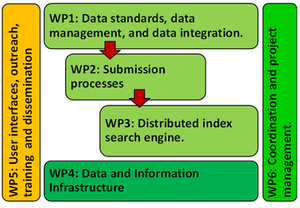
Wheat Information System
An integrated information system for the wheat research community
This project aims at building an International Wheat Information System, called hereafter WheatIS, to support the wheat research community. The main objective is to provide a single-access web base system to access to the available data resources and bioinformatics tools. The project is endorsed by the Wheat Initiative.
WheatIS resources:
WheatIS principles:
● Collective building of the WheatIS to better respond to the needs of the international wheat community;
● Incremental implementation to offer rapidly an operational information system;
● Emphasis on Quality Assurance to serve as a framework for an approach with incremental implementation;
● Promotion of an open-access model for data exchange;
● Reliance on a distributed system;
● Use of Virtual Machine and Cloud Computing technologies to facilitate sharing data and tools;
● Promotion of the visibility of each participating platform to contribute to their sustainability.

WheatIS Expert Working Group (EWG)
The project is driven by the wheatIS EWG, a network of experts that congregates a group of volunteers willing to participate to the WheatIS project, selected after an open call for proposals. They elect for a 2 years period a chair and 3 co-chairs to lead the group. One co-chair is changed every year.
Chair: Taner Sen
Co-Chairs: Mario Caccamo, David Edwards, Hadi Quesneville
Expert Working Group members: Michael Alaux, Ruth Bastow, Ute Baumann, Vijai Bhadauria, Laurel Cooper, Robert Davey, Kate Dreher, Jorge Dubcovsky, Paul Kersey, Gerard Lazo, David Marshall, Klaus Mayer, Amidou N'Diaye, Christopher Rawlings, Mark Sawkins, Doreen Ware
The deliverables of the WheatIS EWG are:
1- Creation and animation of a network of experts, collaborating to provide the scientific community with wheat genetic and genomic data.
2- Standards, protocols, and processes for wheat data sharing in keeping with different international bioinformatics initiatives. Guidelines and recommendations will be disseminated and shared between bioinformatics teams and the scientific community. These documents will be accessed through a web site and regularly updated according to the evolution of the scientific fields.
3- A web platform allowing the exchange of standardized data files, built on a collaborative and interoperable network of platforms, working together.
4- A single entry point for the wheat community to find available data through a full text search engine, allowing searching the central repository and the databases of the platform network dynamically.
5- Integrated data focusing on relevant data sets, chosen with the wheat scientific community.
6- Develop Project work plan and annual activity reports of the EWG activities.
7-Research proposals to get funds for the implementation of the WheatIS.

Work packages
WP1: Data standards, data management, and data integration.
Objectives
This workpackage will define standards for data exchanges. Part of the activity will be to follow and participate in international initiatives (e.g. TransPLANT, crop and trait Ontologies, ….) and to propose standards when they are missing.
a Wheat Research Data Alliance (RDA) Agricultural data interest group has been set up to manage this WP.
Coordination and implementation of data integration is also a goal of this work-package. It will rely on free data exchanges between WheatIS nodes to integrate differently the same data according to different users’ needs. Hence, several WheatIS nodes for data integration will be identified. Data curation managed by WheatIS nodes will insure reliable data integration.
This workpackage will interact closely with WP5: User interfaces, outreach, training and dissemination.
Tasks
● Survey of existing standards
● Coordination of data exchanges and data release policy
● identification of end-users’ categories and WheatIS nodes to support their activities
● Data curation management
● Implementation of Web services and database mediation (DAS, InterMine, BioMart).
WP2: Submission processes.
Objectives
This work package will provide user support for data submission to the WheatIS or other international repositories (NCBI, EMBL,…).
The WheatIS will offer a space allowing data submission and the exchange of standardized data files with their associated metadata. The submission process will check for required metadata information and the correct use of data standards and ontologies as defined by WP1.
This space will be also used for data exchange between WheatIS nodes or any wheat scientists. Data correctly formatted and respecting defined standards will be provided here promoting data interoperability.
Tasks
● Implement a distributed data file repository with web access and data submission workflow. Test available tools such as Dspace.
● Ensure scalability and security through data replication and data sharing. Test existing solutions such as iRODS
WP3: Distributed index search engine.
Objectives
A full text search engine will be set up on the WheatIS web portal, allowing to dynamically search remote wheatIS nodes databases (see figure 1). Users will be able to connect to the WheatIS portal and type a keyword, or a term, that will be searched remotely in each node. Results will be provided as a brief summary of the matching data (e.g. Identifier, Name, Short description) with links to access the remotely hosted data. This tool will allow the researchers to discover available data in the WheatIS core and its nodes, from simple keywords. Indexing with public Google web and Google scholar search engines will allow scientists to find data through the Google interface without necessarily knowing the WheatIS portal, hence offering another way to discover its existence.
Tasks
● Implement quick search functionality using distributed indexes. Implement SolR servers in the WheatIS nodes
● Define file formats for data extracted from databases.
● Implement a standalone server able to convert extracted files into searchable indexes.
WP4: Data and information infrastructure.
Objectives
Distributed architecture is the backbone of the WheatIS. It will use Data Grid technologies implemented mainly on virtual machines to easily distribute portal instances between WheatIS nodes, but also to insure robustness, speed, and easy development.
Tasks
● Identify requirements and design integrating architecture
● Virtual Machine implementation
● Hardware infrastructure setup
● Building of Cloud environment
WP5: User interfaces, outreach, training and dissemination
Objectives
This workpackage will ensure that the WheatIS project is implemented in interaction with users and other international bioinformatic initiatives. It will establish links with the wheat research community to inform them on the progresses, get their feedback and answer their needs.
Hence, integrated activities with the IWGSC EWG will be developed to define gene annotation nomenclature and annotation, and reference sequence life cycle. The WheatIS will need to be sufficiently developed in 2016 to display and share the data produced by the IWGSC (reference sequence, annotation,...). Agreement for data access and data release policy will be supported by the WheatIS. Tight connections with other EWG will be maintained, when they are created, to insure proper data sharing and integration for the various topics of interest.
A web portal will be implemented and maintained to provide a single access point to the WheatIS data, the bioinformatics services offered by the nodes, informations on the project, and guidelines and good practices for data sharing and data submission.
Tasks
● Build and maintain the WheatIS web portal
● Communicate through the web portal, mailing lists, twitter, facebook, …
● Organise users’ survey to get their needs and measure the satisfaction
● Organise bioinformatic training for the wheat research community
● Create or strengthen links with international initiatives related to wheat research or plant bioinformatics.
● Attend international conferences and meetings, present WheatIS results and report other groups’ advances and needs.
WP6: Coordination and project management.
Objectives
This workpackage manages, coordinates and communicates on the EWG activities and the WheatIS project.
During the project duration, annual meetings will be organised to discuss the progress, the needs and the future orientations. They will be organised in coordination with other international meetings to facilitate logistics and limit travels cost. Regular teleconference calls (at least 3 per year) will maintain the contact between the participants. Working groups will interact monthly to work on specific topics. Annual activity reports will be provided to the Wheat Initiative committees.
Tasks
● Set up governance. Organise committees and election of chairs.
● Provide a project workspace to exchange documents between EWG members.
● Organise meetings.
● Write annual reports.

Funding the project
Building and maintenance of the WheatIS will rely primarily on the contributions of the partner WheatIS nodes and their funding institutions, each of them dedicating resources to the project. Additional resources will be looked for from national or international calls for proposals, with the EWG coordinating proposals and writing letters of support.
Steps will be implemented rapidly by distributing solutions available in a WheatIS node partner to the other partners, in a transparent way for the end-users. This approach would facilitate other WheatIS nodes (not yet identified) to join the initiative. This will however necessitate the adoption by all platforms of solutions provided by others.
The project will start from a group of WheatIS nodes having received funds from their supporting institutions. WP1, 5 and 6 could start with no additional resources. However, for a quick start of this project, WP2, 3 and 4 will require newly recruited staff paid with institutional funds. Infrastructure capacities should be supported by the institutions directly to their WheatIS node.
One coordination meeting between the WheatIS nodes will be organised each year (approximately 50,000 euros per year including travels and accommodation for 30 persons), which should be supported by the Wheat Initiative in the absence of other funding.
Creation date: 19 Jun 2013
 eZ Publish
eZ PublishPublication supervisor: A-F. Adam-Blondon
Read Credits & General Terms of Use







